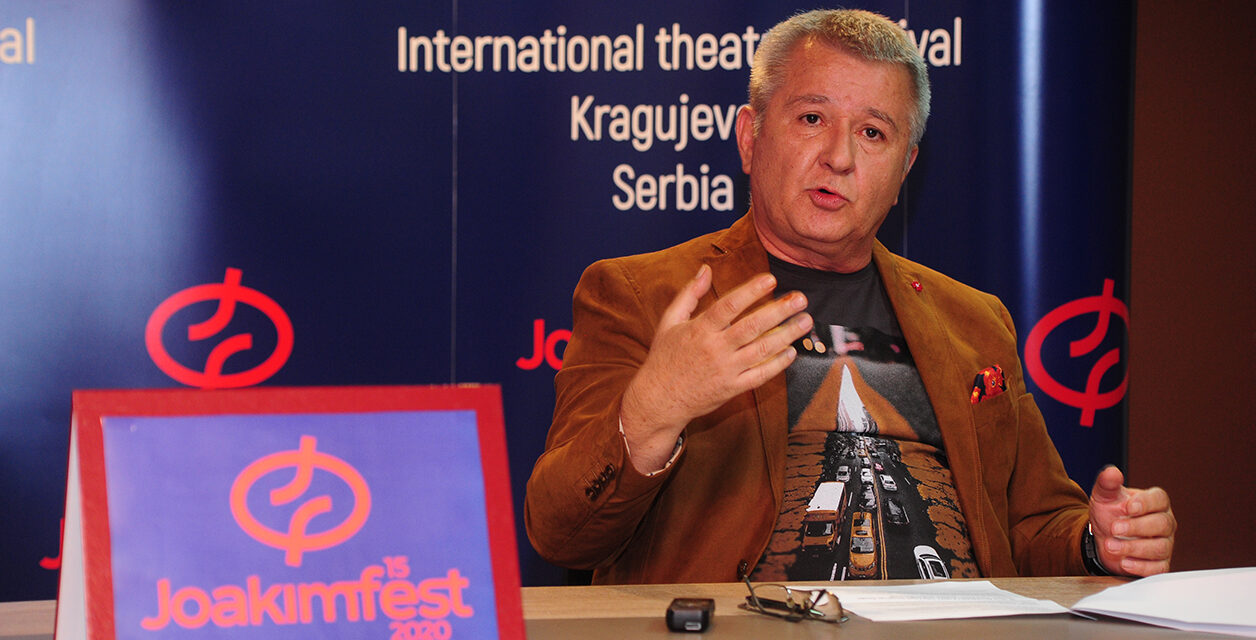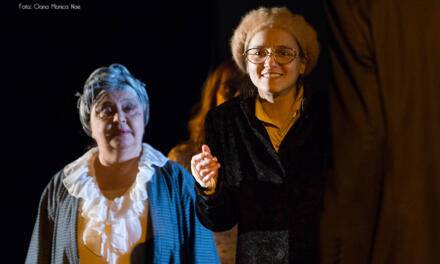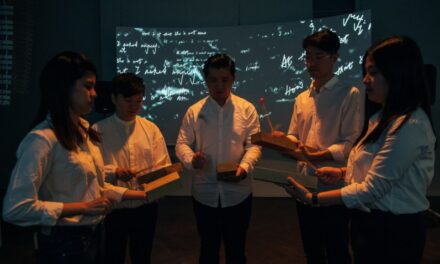Slobodan Savić (born in Požarevac in 1964) is an author, theatre critic, writer, and journalist. He has a degree in General Literary Studies and Literary Theory from the University of Belgrade, Faculty of Philology. He has twice been elected the artistic director and curator of the International Theatre Festival Joakimfest, twice been the curator of the Festival of Professional Theatres of Vojvodina, and the curator of Bora`s Theater Days (National Theater Festivals). He is a moderator of roundtable discussions, president and jury member of domestic and international theatre festivals (The Sterija’s Theatre Festival, INFANT, Joakim Inter Fest, The Joakim Vujić Festival, Festival of Professional Theatres of Vojvodina, Festival of the Classics, Festival of Premieres, etc.). Since 2002 he has been an author and editor for Serbia’s National TV network (Serbian Broadcasting Corporation) on the Department of Culture and Artistic program, and he is the founder and author of the cult TV series Reading of the Theatre. He is the author and editor of several theatrical books and many essays published in Profil, Dama, and Jefimija; Politika, NIN, Duga, Intervju, Ilustrovana Politika, Blic, Glas javnosti, and Evropa. He is a member of The Journalists’ Association of Serbia and the Association of Theatre Critics and Theatrologists of Serbia (ITCA). He has won the Annual Award of Radio Television of Serbia, where he has been performing a number of important assignments since 1989.
Ivanka Apostolova Baskar: Let’s start with your current professional activities as a selector on the 14th and 15th Joakimfest, in Kragujevac, Serbia and The International Theater Festival. What is the key responsibility of an aesthetically-themed, educated, and careful festival selector for the program to be successful, convincing and impressive?
Slobodan Savic: Fifteen years is neither a lot nor a little amount of time, but it is quite enough to outline and position a theatre festival. Since its inception, the festival has undergone ups and downs, financial and organizational difficulties, aesthetic and poetic meanderings and dilemmas. To properly establish a theatrical festival, to make it relevant for a local and a wider theatrical community, to position it within the theatrical and cultural boundaries of its native region, country and beyond, the requirement is to possess a clear vision, a solid concept, and corresponding funding. Kragujevac used to be the capital, and today it is the economic and academic hub of central Serbia. This city deserves a better theatre festival, one of the best! The audiences always deserves more and better.
The concept is quite simple and contained in just two words: perception and recognition. On one hand, it makes the audience perceive the representation of modern theatre expression and enables them to recognize the dilemmas and problems of modern man and society in those performances. This is so they understand and recognize themselves, and perceive and recognize specificity in general, and general in specificity. Since Ancient Greece, that has been one of the fundamental roles of theatre.
Two years ago, during the festival’s first press conference after taking the reins as artistic director and curator, I announced radical, structural changes and the possibility of Joakimfest to be positioned among the top three most important international theatre festivals in Serbia by year 2020. This would be aided by stable financial backing and conscientious work. If we are to judge based on the performances I have selected, I believe the goal was already achieved last year.
IAB: Among other things, you managed to raise Joachimfest to the level of the three most relevant theater festivals in the Republic of Serbia: BITEF, Sterija’s Theatre Festival and Joakiмfest.
SS: Sterija’s Theatre Festival and BITEF are the two most important and longest-running theatre festivals in Serbia. It’s not reasonable to be compared to them, but it’s nice to be right next to them. The budgets for these festivals are ten times greater than that of Joakimfest, the organizational structure is on a much higher level, and so on. But let’s get back to Joakimfest. It was not easy to improve the festival so quickly, but it was a great challenge. I love challenges and difficult tasks; they inspire and encourage me. Today, it is very difficult to make progress in the arts and culture in general, not only in theatre, even in the capital city where the greatest concentration of money and creative potentials resides. I have been living and working in Belgrade since 1983, but I was born and raised in a small town and I know very well what a small community is. I know how the so-called “crab mentality” – stepping back in order to avoid confrontation at all costs – suffocates and represses you. However, I have always believed that upcountry – the smaller cities and villages – is a geographical, not a spiritual or intellectual category. But it is difficult to come up with fresh, ambitious ideas in an environment that tends to lull you into mediocrity; people immediately perceive you as a freak and a conceited “philosopher.” People in Serbian cultural institutions are underpaid and unmotivated, to them even status quo is a lot. But it’s not just about money. I think the key to my success with Joakimfest is very simple: I approached the job professionally and responsibly, unlike previous curators who approached the festival as a kind of a provincial review of randomly selected theatre performances that need to be carried out quickly and be gone. I had a clear two-year vision and unwavering attitudes. I worked hard, mostly following the principle of the “one-man band,” then slowly gathered a small team of associates I could rely on, who believed in my ideas, who were interested in being introduced to the work and who believed in the possibility of improving the festival.
The festival has had ups and downs as it sought a solid concept. Since I was elected curator and artistic director, radical changes have been made to the structure and concept of Joakimfest. Today, it is a festival of contemporary, modern, socially, aesthetically, and poetically relevant theatre which with its selection of plays strives for visibility and recognition not only in its local community, but in the entire country and wider region. It has a Euro-regional concept, based on a selection of performances in full accord with modern performance and theatre-related practices. Joakimfest celebrates and fosters aesthetically sophisticated, socially responsible, subversive, and emancipatory theatre that grapples with burning issues and phenomena of the times we live in.
I don’t have to explain how hard, taxing, stressful, and even exhausting, it was to make this year’s selection and organize the festival in pandemic conditions of fear and qualm, closed theatres and borders, and with the inability to predict what will happen tomorrow, let alone a month or so in advance. But at no moment did I give up, and I completed the selection on time. After all, it’s easy to give up when you do not select by quality. But I had. The organization of an international theatre festival in such conditions, when most festivals and other events had been canceled, is a supreme accomplishment for both the organizers and the hosts, but above all, for all festival participants in this “new normal”. Knjaževsko-srpski teatar and the city of Kragujevac can be proud of that.
Unfortunately, 48 hours before arrival two theatres (from Romania and North Macedonia) canceled their participation because several members of their ensembles tested positive for COVID-19. The audience in Kragujevac did not have the opportunity to see two great performances, The Doll’s House and Animal Farm. However, this year Joakimfest preserved its continuity and international character, and more importantly, it took the audience back to the theatre and put the actors back on stage. The joy of that meeting, and exchange of energy that we were missing so much all these months, was most evident in the fact that the audience applauded the actors and the actors applauded back.
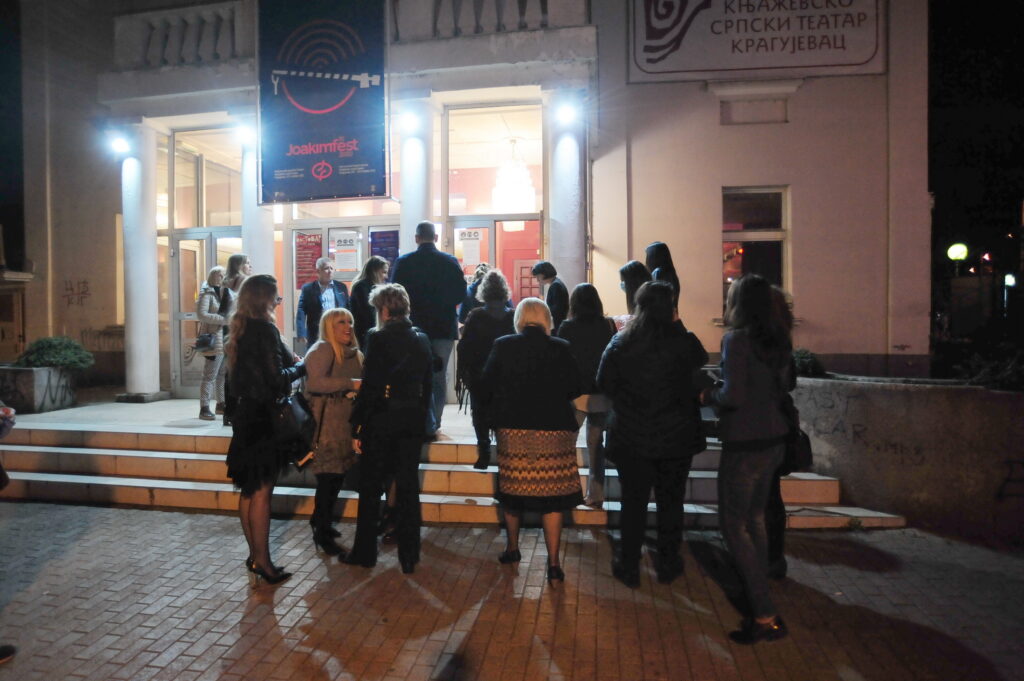
Photo Credit: Joakimfest
IAB: Your FESTIVAL motto at Joachimfest is, “Theater in an isolated society: what is your attitude towards the place and perspective of theater art, and the social role of theater under the stratum of COVID 19, or Who is Afraid of the Theater”.?
SS: I think that during the pandemic the audience is safer in the theatre than on public transport, in cafes and restaurants – not to mention gyms, casinos and shopping malls. Of course, the safety of the actors on stage is a completely different topic, because they are directly exposed. I would not like to speculate on COVID-19; it is a protean virus, an enigma even to expert epidemiologists and physicians.
The world was polarized and divided even before the pandemic. It was divided into the rich and the poor, global rulers and small nations, and great and small cultures. Today, the world is divided into healthy people and those sick with COVID-19, those who have access to an appropriate treatment and those who do not, those who will be able to buy the vaccine and those who will not. At first glance, the subtitle of this year’s festival (Theatre in an Isolated Society) refers to the difficult situation that the world, art and theatre found themselves in during the pandemic. But that is only the first layer of meaning. More importantly, I have chosen the performances that thematize life in an isolated society in a relevant, theatrical way. It doesn’t matter if we are isolated due to illness or poverty, or denied human rights within our own family and marriage (like Ibsen’s Nora), or within a small-scale totalitarian community that alludes to society as a whole (Animal Farm). Or, we are isolated in the world of post-truth (The Wound Philoctetes), in the categorical imperative of progress and success (Why Does Herr R. Run Amok?) or by a manipulation-prone voting machine and cheap labor whose protagonist is the so-called little man (It’s All Gustav’s Fault), or you feel isolated in your small hometown (like Janis Joplin).
We who live in the Balkans, and in Serbia, know very well what it is like to live in an isolated society. We are economically, politically, and culturally isolated; we are behind closed borders, behind lowered boom barriers. The theatre that, in an artistically and aesthetically referential way thematizes different types of isolation despite the required physical distance, is at the center of my selection this year. That is the essence. Covid-19 is just one of the references, a ubiquitous cause and a menacing consequence.
IAB: You say that real theater does not exist without the presence of actors on stage and without an audience? On the other hand, an advantage of digital premieres and reruns (in these restricted circumstances) is the numerous local and international views the performances receive. Digital tools and information were routine even before COVID-19.
SS: Of course, this is useful information. We all get informed thusly, especially if we can’t travel to festivals due to a modest budget. Due to the pandemic, I watched half of the selected performances for Joakimfest live, and half as videos. But this is an emergency situation. I always prefer watching a performance in a theatre. And I want to emphasize that. Despite the so-called new theatrical tendencies, despite theories and studies trying to explain them, true theatre does not exist without the presence of an actor on the stage, just as it cannot exist without an audience. This has always been the case, since the first performances of our distant ancestors in barely lit caves, since Ancient Greece. This has been most evident in the past months when watching video recordings of theatre performances that have flooded the Internet. Theatre has always been for the community and in the community, of those on the stage and those in the audience. As much as it is in discord with contemporary theories of performing arts, without that community, without the interaction of actors and audiences, there is no true theatre. A theatrical performance is a unique, one-of-a-kind act. Just as we cannot enter the same river twice, so we cannot watch the same performance twice, no matter how many times we re-watch it. That is the unique charm of theatre. This is why I believe the spectators were enjoying the selected performances this year as well, despite the fact that the audience had to wear masks and sit at a distance, both from the actors and from each other.
IAB: You are one of the most eminent theater critics in Serbia and author of the excellent TV show Reading of the Theater, which we see and consult continuously. Today, when our politicians put culture last in economic terms, and the media suppresses arts and culture shows by programming too many annoying and debatable political-economic shows, and superficial popular entertainment content, you are persistent with your TV show.
SS: Yes, I have been resolute and persistent for almost two decades on National Television, and before that for more than ten years on National Radio. But I am afraid I am losing my strength and will. I am ashamed of that, and sometimes angry with myself; I even question what I am doing and whom I am addressing. Programs dedicated to culture and the arts have been marginalized even on National Television and in the once-leading, responsible print media. Don’t get me started on other media, the electronic and the printed ones. It is a deluge of vulgarity, sensationalism, coarseness, and kitsch, a public sale of the trashiest content. It is a cesspool of adages and worse, if there could possibly be anything worse. There is probably something worse and I’m afraid we’ll see it soon. It is pathetic, contemptible, disturbing, humiliating. I know, but it is of no consolation to me, that it is like that everywhere: in the region, in Europe, in the whole world. The horror! Everything is degraded and humiliated, from education to cultural and state institutions. Knowledge, education, and professional responsibility are in inverse proportion to the performance of public functions, from politics to culture. That is the reality we live in.
The production of arts and culture programs is at the lowest conceivable level even on National Television. It is the same in serious print media, and they can be counted on one hand. Who will take care of culture, art, educational and scientific programs if not the Public Broadcasting Service?! My colleagues and I are fighting with the last available ounces of strength. How long will we endure? And does anyone even care about it at all?
I have done my utmost to bring theatre closer to the wider TV audience using the television format. I have changed the form and have taken an informative, documentary, critical, semi live-action approach. Sometimes I was ironic or cynical, sometimes harsh or benevolent. In most cases I was argumentative, but always within the framework of constructive criticism. I have never insulted or underestimated anyone, even when I didn’t like certain performances or work. I have been in the wrong of course; it is such a human thing to be. I have been supported wholeheartedly and sincerely and when I was being attacked, they were attacking me with all their might. That is human as well.
IAB: Before COVID 19 occurred, in several shows you bravely but argumentatively criticized the situation in contemporary Serbian theater. This includes corruption of spirit, a crisis of ideas, deficit of long-term vision, a lack of initiative, persistence, perseverance, responsibility, and professional and dedicated attitudes towards work, too much opportunism, and too little talent. What feedback and reactions did you encounter given the political correctness and politics in crisis, which marginalize professional criticism in general?
SS: Six or seven years ago, in one episode of the series Reading of the Theatre I “announced” the clinical death of critically sensible viewpoint in theatre and about theatre, but not only in theatre and about theatre, in Serbia. It may have meant something then, and today it is almost meaningless, because critical thinking in Serbia is clinically dead, as well as artistic criticism, which has been marginalized or ridiculed by the media.
Then I also talked about the crisis of ideas, the lack of vision, reckless theatrical repertoires, irresponsibility, improvisations, opportunism, and so on. I appealed for the distinguishing of criticism for the sake of criticism from constructive criticism.
It is true that the budget for culture in Serbia is below 1 percent, i.e. at the level of a statistical error, and that theatre budgets are even smaller. It is a disgrace and shame for the state. But money isn’t everything; ideas and resourcefulness are worth something. With honorable exceptions that prove the rule, political correctness today is the ticket for everything: sinecures, directorial positions in theatre, and authorial engagements. It has long since become a “new normal”, way before COVID-19. I fear that a far more dangerous virus has affected theatre and culture in Serbia, and its devastating consequences could be more far-reaching than those of COVID-19. I think that employees of most government-funded theatres in Serbia are not aware of that. For years, the monthly repertoires of leading theatres in Serbia have been compiled based on the availability of actors who do TV series and movies instead of the other way around. In Germany, for instance, that is unheard of. The alternative scene is almost non-existent, and freelance artists will suffer the during the pandemic. Even private, commercial boulevard theatres will incur damage.
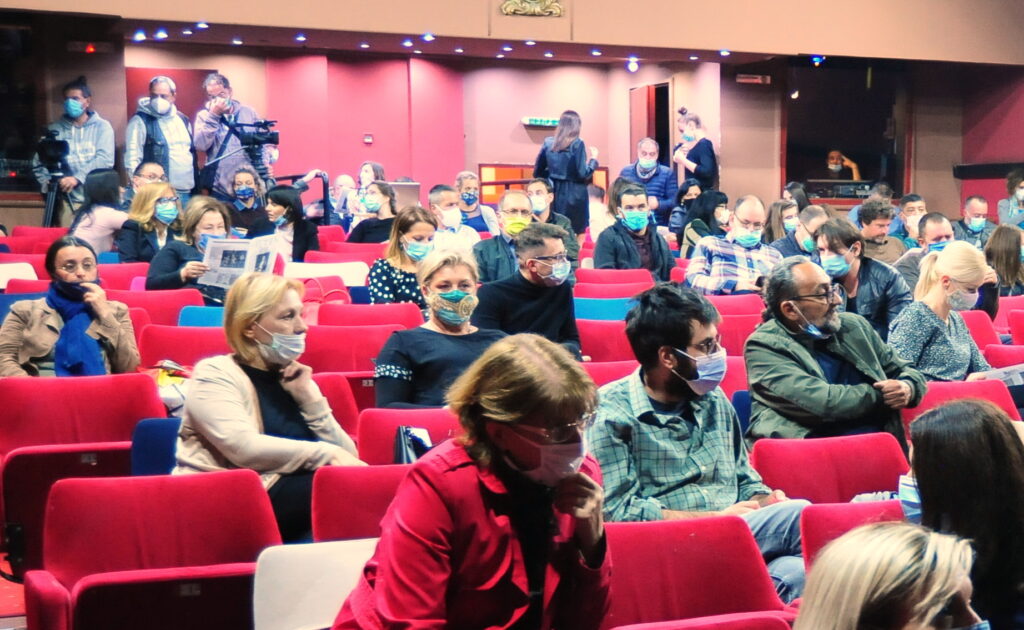
Photo Credit: Joakimfest.
IAB: Disregarding the new global economic crises, for what reasons do the best playwrights and directors self-compromise and become lazy, and have less passion for theatrical creation?
SS: I don’t know. Maybe because of money, vanity and personal promotion, or accommodation and trade in “old glory and success.” Maybe because they can’t give up on theatres that mean the world to them. Perhaps new, fresh energy would compensate for their withered theatrical passion. However, it should be understood that no artist, not even a supreme one, could constantly produce outstanding works of art. This is not possible even in sports, which rely more on constant workouts and physical fitness, and less on talent, acuteness and creativity.
IAB: At the center of the existential trend we live in – the dehumanization and mythification of the digital world and its tools and facilities, which promote the illusion of solving all human problems – what are your predictions for theater in 2021 and in post-COVID conditions? Are the masks, gloves, disinfection and social distance a productive source of inspiration?
SS: I don’t know what theatre will look like during and after the pandemic. I guess that will pass, as well. I can’t imagine actors on stage with masks, at the prescribed physical distance without contact, or without an outpour of passion. But it is not ruled out that the “new normal” could give birth to new theatrical poetics and aesthetics, and directing and acting practices. After all, we have already had theoretical discussions about postdramatic theatre, about whether an actor is an actor or a performer, whether an actor is necessary on stage at all (as in works by Heiner Goebbels, Stefan Kaegi, and so forth.). With all due respect, that is not my cup of tea in the theatre, but I respect the new theatrical tendencies, and I watch them frequently and with joy.
After COVID-19, the world will never be the same. It is worldwide public opinion, but a common statement and a firmly rooted, mock-profound phrase in everyday life. For months, we have been living in a world and a time of “new normal” which, among so many other things, requires physical distance between people. The new normal has deprived us of touch and hugs, handshakes and kisses. It has shuttered interstate borders, theatres and cinemas, concert halls and museums, restaurants and sports stadiums, schools and universities. Isolation, self-isolation and physical distancing have become our everyday life, as if we have not been withdrawn enough in our own homes, and ourselves as if we have not been sufficiently alienated and self-isolated in our own loneliness, in artificial, virtual and viral worlds. Is this new normal, a bitter fruit and devastating consequence of the COVID-19 pandemic that has conquered the world without a single bullet being fired? Or is it the way of life we have been accustomed to since we agreed to express our feelings through text messages, emojis and stickers, and that the “reality”, tangibility, uniqueness and bliss of real life is being mediated by electronic media and social networks? Perhaps time and further events in this twisted world will provide us with some answers or guidelines. Perhaps. It is our duty as self-conscious and responsible individuals, as it is the duty of responsible theater and art in general, to ask questions.
IAB: Slobodan Savic, thank you very much.
Skopje/Belgrade, 2020
This post was written by the author in their personal capacity.The opinions expressed in this article are the author’s own and do not reflect the view of The Theatre Times, their staff or collaborators.
This post was written by Ivanka Apostolova Baskar.
The views expressed here belong to the author and do not necessarily reflect our views and opinions.

